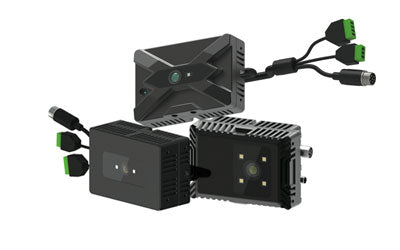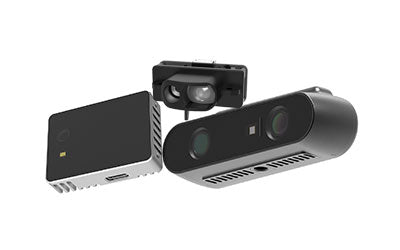ToF Sensors in Drone Warehouse Tracking: A New Era in Smart Logistics
With the rapid growth of e-commerce and the logistics industry, the importance of warehouse management is becoming increasingly evident. To meet the ever-growing demands of complex warehouse operations, companies are seeking more intelligent and automated solutions. The innovative technology of drones equipped with ToF (Time-of-Flight) sensors brings a fresh perspective to warehouse tracking and management, serving as a key to improving efficiency and accuracy in warehouses.
Role of ToF Sensors in Drones
ToF sensors measure the time difference of light pulses reflected from target objects to accurately calculate the distance of those objects. With quick response, precise distance measurement, and strong anti-interference capabilities, ToF sensors enable drones to operate efficiently in warehouse environments, particularly in large-scale warehouses, complex layouts, and tight spaces.
Advantages of Drones with ToF Sensors in Warehouse Tracking
-
Efficient Inventory and Stock Management
In traditional warehouse management, inventory counting is time-consuming and labor-intensive, especially in large warehouses. Drones equipped with ToF sensors can autonomously patrol and fly between shelves, scanning the real-time positions and quantities of goods, and integrate with warehouse management systems for precise tracking.ToF sensors can quickly generate 3D models of shelves, detecting information such as the height and distance of goods in real time. This ensures drones can accurately detect and count both individuals and objects, and record inventory changes. Compared to manual counting, drones greatly enhance speed and accuracy, providing 24/7, uninterrupted inventory management, while reducing human errors.
-
Intelligent Goods Tracking
ToF sensors enable drones to track the movement and position changes of goods in real-time. For example, when goods are moved from one shelf to another or to different areas, the drone can precisely detect and record these movements, updating the information in the warehouse management system to ensure the traceability of goods.This technology is not only applicable to regular goods but also provides special monitoring for high-value or fragile items. In warehouses requiring theft prevention or high security, the combination of ToF sensors and drones significantly enhances goods tracking and security.
-
Optimizing Warehouse Space Layout
The accurate 3D spatial information generated by ToF sensors helps drones collect data and perform spatial analysis in warehouses. By monitoring the distribution and occupied space of goods, warehouse managers can optimize layouts and utilize space more efficiently, improving storage capabilities.Additionally, ToF sensors can detect the spacing and height between shelves, helping drones navigate complex spaces without collisions or errors. This is especially critical in dense storage environments with varying shelf heights, ensuring that drones perform tasks efficiently and safely.
-
Autonomous Navigation and Path Planning
One of the biggest challenges in drone operations within warehouses is navigating complex environments, especially precise maneuvering between narrow aisles and high shelves. With its powerful distance sensing capabilities, the ToF sensor enables drones to autonomously plan routes and avoid obstacles accurately, ensuring safe and efficient movement within the warehouse.In the future, as AI and drone technology continue to advance, ToF sensors will be deeply integrated with drone autonomous navigation systems, allowing drones to make smarter decisions. Drones will automatically adjust flight routes based on real-time warehouse layouts and goods distribution, optimizing inventory tracking and management processes.
-
Reducing Labor Costs and Improving Efficiency
In traditional warehouses, tasks such as moving, counting, and sorting goods often require significant manual labor, leading to high time and cost investments. Using drones equipped with ToF sensors, the reliance on human labor is greatly reduced. Drones can autonomously complete many repetitive warehouse tasks, such as inspections and inventory checks, cutting labor costs and boosting operational efficiency.In large logistics centers or during peak periods, automated drone systems can quickly respond to inventory dispatch needs, ensuring high efficiency and accuracy in logistics operations, shortening order delivery times, and enhancing customer satisfaction.
Future Development of Drones with ToF Sensors in Warehouse Tracking
-
Collaborative Operations with Multiple Drones
As drone technology matures, the future of warehouse management will involve collaborative operations with multiple drones. Thanks to the precise spatial sensing capabilities of ToF sensors, multiple drones can work simultaneously in warehouses, with clear task division and no interference with each other, significantly improving warehouse management efficiency. Advanced algorithms will allow these drones to autonomously distribute tasks and optimize workflow. -
Integration with Other Sensors for Comprehensive Data Collection
ToF sensors can be combined with other types of sensors (e.g., RFID, visual sensors) to provide more comprehensive warehouse information. For example, RFID sensors can help drones quickly identify goods with RFID tags, while ToF sensors provide real-time spatial positioning information. The combination enables drones to not only track goods' positions but also gather detailed information, achieving true 'smart warehousing.' -
AI and Big Data for Precision Management
In the future, data collected by drones and ToF sensors will become an essential part of warehouse big data. With AI and big data analysis, warehouse managers will gain more accurate operational insights, such as optimizing goods placement, adjusting inventory strategies, and predicting future warehouse demands. This intelligent data management will push the warehousing industry toward 'smart warehousing.' -
Application of Drones with ToF Sensors in Cold Chain Logistics
For cold chain logistics, it is crucial to maintain continuous monitoring of goods during transportation and storage. Drones equipped with ToF sensors can track goods in cold storage areas while monitoring the environmental conditions of the warehouse to ensure that goods remain within the proper temperature range. In the future, ToF sensors will enable drones to play a broader role in logistics, including the management of high-demand supply chains such as medical supplies and food.
Conclusion: Transforming Warehouse Management with ToF Sensors
ToF sensors provide drones with powerful spatial perception capabilities, demonstrating great potential in warehouse tracking and management. From automated inventory counting and precise goods tracking to optimizing warehouse space utilization, drones equipped with ToF sensors are providing strong support for the intelligent upgrade of the warehousing industry. As technology continues to develop, the combination of drones and ToF sensors will open up more possibilities for future intelligent warehouse management, driving a revolution in logistics efficiency.
Synexens 3D Of RGBD ToF Depth Sensor_CS30
Our professional technical team specializing in 3D camera ranging is ready to assist you at any time. Whether you encounter any issues with your TOF camera after purchase or need clarification on TOF technology, feel free to contact us anytime. We are committed to providing high-quality technical after-sales service and user experience, ensuring your peace of mind in both shopping and using our products
-
で掲示されます
CS30



